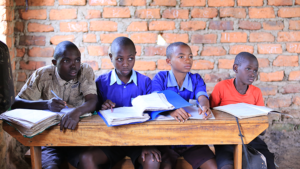Following the success of their groundbreaking school gardening project, the Movement of Life Uganda team has recently launched a new community-based project. Involving farmers, teachers, photographers, builders, and other community leaders, the project involves setting up demonstration homes in villages to promote our Free Health for All, Free Food for All, and Work for All campaigns. A key goal of the project involves teaching the families living in these homes how to grow micronutrient-rich fruits and vegetables, the consumption of which will improve their nutritional status. As their harvests increase, the families involved will also learn how to increase their incomes by setting up small businesses to sell the surplus produce they grow. Through teaching and inspiring their local communities with the knowledge and experience gained from these activities, the families will help further our global goal of improving the health and lives of people worldwide.
Organized by the Uganda-based Rath Health Foundation, a total of 12 families from the southwestern region of the country are taking part in this project. Unlike conventional gardening activities, an important aspect of the initiative involves teaching the families about the vital roles of essential micronutrients in maintaining health and preventing disease. Having learned about the importance of vitamins, minerals, and other micronutrients in this way, the families can then better understand how growing and consuming micronutrient-rich fruits and vegetables will benefit their health. In addition to growing fruits and vegetables some of the families are also keeping honeybees and rearing livestock, thus further improving the nutrient content of their diets.
The families are also learning how to make their own vitamin C and polyphenol-rich powder using dried orange and lemon peelings. Impressively, the mother of one participant has already testified that regularly drinking tea made from this powder healed her arthritis!
Improving the educational performance of schoolchildren
Malnourishment is common in Uganda. Families often survive on one meal a day and sometimes even have to go without food. Not only does this result in numerous negative health effects, in the case of schoolchildren it particularly affects their concentration and ability to learn. This means that undernutrition has a direct effect on a country’s economic potential. As one of the world’s poorest countries, Uganda therefore stands to achieve significant economic benefits if the nutritional status of its people can be improved at a national scale. Work carried out in Ukraine by scientists at the Dr. Rath Research Institute has already shown that improving the micronutrient status of schoolchildren benefits not just their physical health, but also their test scores.
The lack of a sufficient family income is a significant factor influencing the likelihood of children in Uganda underachieving at school. When money is short, Ugandan children frequently have to drop out of school as a result of parents being unable to afford the necessary school fees. We therefore hope that through teaching parents how to increase their income by selling the surplus food from their harvests, our community gardening project will eventually enable greater numbers of Ugandan children to complete their education.
Step by step, the families taking part in this innovative project can help lead the way towards ending malnutrition, improving health, improving performance at school, and reducing unemployment not just in Uganda and Africa, but also in the wider developing world. We strongly believe that through teaching people how to produce their own micronutrient-rich food, a better world is possible.









